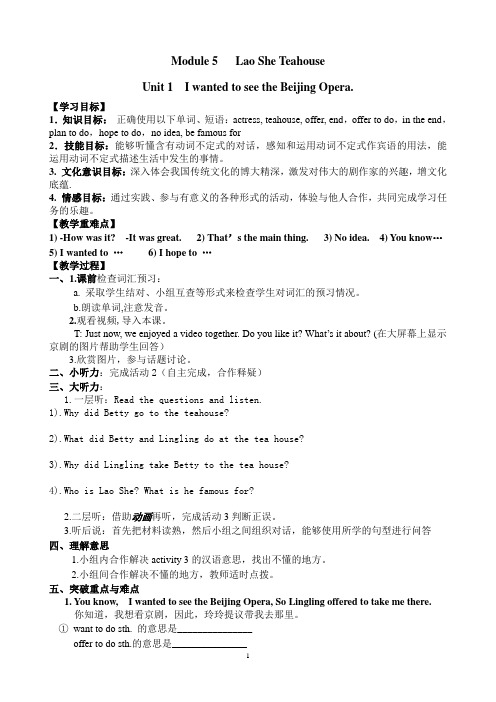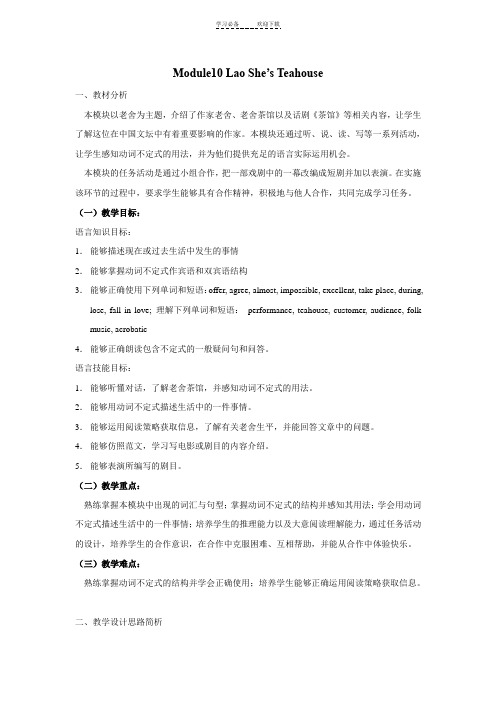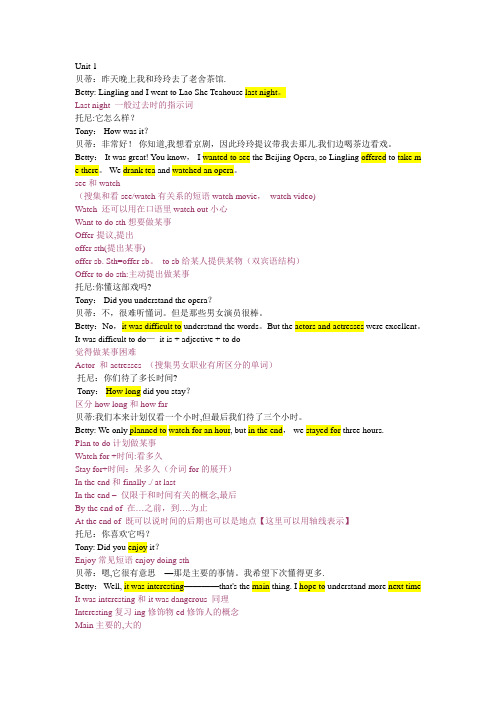laoshe teahouse 重点总结
Module10LaoSheTeahouse本模块重点

语言大师
. 使、让某人做某事。
类似的用法还有, 等使役动词。 . 爱上某人
重点任务: 主要练习, , , , , , 后面接动词不定式做宾语.
是对本模块重点的词汇的练习.
重点单词, .
(.) →(.)
→
重点词组:
..
.
巧记动词不定式的用法:
动词不定式是中学英语一个较难的语法项目,下面的口 诀 可以帮助你快速和准确的记忆:
重难点句子:
分析: 放在句首时,主语是代词时,不用倒装.但主语是名词时 要全部倒装.
. . 类似的用法如, , , , , 等. .’ . 表示”必须” ; ’表示”禁止” .回答的问句时, 要用’ ’ .
? ,. , ’.( , ’ .) ’, .
’. 重点任务: , 重点单词: , , . 单词拓展与辨析: 问候,向…致意 .问候祝贺
.传统的 .传统 . 悬挂
上吊,缴死 重点词组:
辩析: (某事,某物), (任何事), , (每件事)(不,没有东西) 在具体的某一天用
’ ⇒ ’ 理发
.
. . 别聊了! , ! 你们记着呢!
! 快点啊! ! 等等! ’ . 错不了! ’ ! 不会吧! . ’ . 这不吉利。 . . 等着瞧吧!
重点词组:
带上,带来 拿走
有时 季节 月份
;
;
;
重难点句子:
,
.
句子中 , , 都是动词不定式做定语.分别修饰, .
. , 选择,挑选
如: .
八年级英语上Module5LaoSheTeahouseUnit1Iwantedtoseeth

Unit 1 I wanted to see the Beijing Opera.
习题链接
温馨提示:点击 进入讲评
课内知识•夯实基础
1 Actress
6 offered to
答案呈现
2 Teahouse
7 It; to understand
3 offers
9. —Excuse me, is there a bank near here?
—Sorry, I have no idea. (同义替换) ___A___ 【2021·黔西南模拟】
A. I don't know
B. I won't go there
C. I don't tell you
D. I don't think so
10. 他尤其以他的话剧《茶馆》而出名。 He's _e_s_p_e_c_ia_l_ly__ ___f_a_m_o_u_s__ for his play Teahouse.
1. I like the Beijing Opera very much, so Li lei offered
____C____ me to watch it.
C. offers
D. starts
【点拨】offer to do sth.主动做某事, 为固定搭配。
4. I think Chen Kun is one of the best ____C____.
A. doctors
B. players
C. actors
D. actresses
5. The tourists successfully got to the top of the mountain
Lao She Teahouse教案

一、教案背景1.面向学生:中学2.学科:中学英语3.课题:Lao She Teahouse4.课时:15.课前准备:学生课前准备:①作者老舍的简介及作品。
②查询百度网站收集的有关《老舍茶馆》的图片和有关知识资料教师课前准备:多媒体课件①查询百度网站收集的有关老舍的图片、视频以及有关知识资料②查询百度网站收集的有关《老舍茶馆》图片、视频以及有关知识资二、教学目标1.态度与价值观:通过对话剧的学习,培养学生喜欢话剧的兴趣。
初步了解东,西方话剧,伟大的戏作家等。
2.过程与方法:通过学习本课,使学生能够具有合作精神,能够参与表演小剧本。
3.教学重点:通过学习本课,让学生熟练掌握动词不定式,并使学生知道怎样去描述简单的电影或话剧内容介绍。
三、教材分析《老舍茶馆》是外研版中学英语八年级上册第十模块第二单元。
它以老舍和老舍茶馆为话题,进一步学习动词不定式的表达方法。
使学生进一步了解这部话剧和中国文化。
教学重点:1. 动词不定式的运用。
2、通过学习本课,掌握一些写作方法,会描述简单的电影或话剧内容介绍。
四、教学方法本课主要采用情景教学法和任务型教学法。
同时整堂课都穿插竞争机制,鼓励学生小组团结互助。
在教学中充分运用多媒体辅助教学,加大了课堂密度,提高了教学效果。
五、教学过程(一)课前齐读单词,单词竞赛。
1. Read the words together.2. check the words in pairs.(出示多媒体课件上的词汇)(二)读前导入。
1.T:Where can we go to relax ourselves ?同学之间,师生之间可以交流一下,然后提出:T: Now , class, why not go to a teahouse ? 引出本课话题“茶馆”及一个关键句型“Lao She Teahouse gives awonderful welcome to everyone from China and fromall over the world.”【百度图片】/viewthread-4017148.html2.The teacher makes some sentences using“ give awonderful welcome to…….” Then make a model with astudent .A: “Do you give a wonderful welcome to……”B:“Yes, I do./No, I don’t.”3. The students work in pairs like this:A: “Do/Does somebody/someplace give a wonderfulwelcome to……”B: “Yes,…….”“No,……..”4.通过展示幻灯片,告诉学生T: In Lao She Teahouse, we service: tea and Chinese food ,and you enjoy Beijing Opera, folk music, and acrobaticsor magic shows .T: class , do you want to know more about Lao She Teahouse,let’s learn Module 10 Unit 2.【百度图片】/i?tn=baiduimage&ct=201326592& lm=-1&cl=2&fr=ala0&word=%B2%E8%BA%F8%CD%BC%C6%AC/i?tn=baiduimage&ct=201326592&lm=-1&cl=2&f r=ala0&word=%D6%D0%B2%CD%CD%BC%C6%AC#pn=29/i?tn=baiduimage&ct=201326592&lm=-1&cl=2&f r=ala0&word=%C1%B3%C6%D7%CD%BC%C6%AC/i?tn=baiduimage&ct=201326592&lm=-1&cl=2&f r=ala0&word=%C3%F1%D7%E5%C0%D6%C6%F7%CD%BC%C6%AC/i?tn=baiduimage&ct=201326592&lm=-1&cl=2&f r=ala0&word=%D4%D3%BC%BC%CD%BC%C6%AC/i?tn=baiduimage&ct=201326592&lm=-1&cl=2&f r=ala0&word=%C4%A7%CA%F5%CD%BC%C6%AC(三)阅读。
外研版八年级上册英语M5-Laoshe-Teahouse知识整理

M5 Lao She Teahouse Vocabulary &Phrases1、offer to:提议做某事2、plan to:计划做某事3、no idea:不知道4、the main thing:最重要的5、especially:尤其的6、be famous for:因……著名7、send to:送……去……8、take place:发生9、translate into:把……翻译成9、return to:返回Sentences1、We only planned to watch for an hour,but in the end,we stayed forthree hours.我们原本只计划去看三小时,但是在最后,我们在那儿呆了3个小时。
2、I hope to understand more next time.我希望下次可以理解得更透。
3、He wrote many plays,novals and short stories about people’slives,and was named “the People’s Artist”.他写了很多的有关于人们生活的戏剧,小说和一些短篇故事,被誉为“人民艺术家”。
Grammer:1、I want to see the Beijing Opera,so Lingling offered to take me there……O“主动提出做某事”,还有许多的交际用语,如:Would you like……这是一种比较客气的说法Can I ……或是Shall I……这也是一种委婉地提出帮助的方法。
4、in the end,by the end of, at the end of的区别in the end意为最后,终于,只表示时间概念by the end of意为在……之前;到……为止,也只表示时间的概念。
at the end of意为在……的末端;在……的后期,既可以指时间的后期,又可以指位置的末端。
Module 5 Lao She Teahouse 知识点讲义

Module 5 Lao She Teahouse 知识点讲义Module 5 Lao She TeahouseUnit 1 I wanted to see the Beijing Opera.①..., so Lingling offered to take me there.考点1offer/ f / v. 提议;提出① offer sth. 提供某物② offer to do sth. (主动)提出做某事③ offer sb. sth.= offer sth. to sb.(主动)给某人提供某物e.g. She offered a book. 她提供了一本书。
Lingling offered to drive me home.玲玲主动提出开车送我回家。
He offered me an apple.= He offered an apple to me.他主动给了我一个苹果。
② But the actors and actresses were excellent.考点2actress/ ktr s/ n. 女演员e.g. She says, “As an actress, you must be hard-working.”她说:“作为一名女演员,你必须工作努力。
”男actor 男演员waiter 男服务员host 男主人salesman 男销售conductor 男售票员spokes-man 男发言人女actress 女演员waitress 女服务员hostess 女主人saleswoman 女销售conductress 女售票员spokes-woman 女发言人③We only planned to watch for an hour, but in the end, we stayed for three hours.考点3end/end/ n.(时间的)最后一段,末尾v. 结束end 的相关短语:in the end 同义词组为at last, 意为“最后”at the end of 意为“在……的末端/ 结尾”by the end of 意为“到……末为止”,常与完成时连用e.g. He tried several times to pass the exam, and in the end he succeeded. 为了通过考试,他努力了几次,最后他成功了。
初二英语上册(外研版)module5laosheteahouse知识点总结

初二英语上册(外研版)Module 5 Lao She Teahouse知识点总结一、重点词汇actress·基本用法actress n. 女演员He fell in love with an actress.他爱上了一位女演员。
·知识拓展--相关单词1. act v. 行动,表演She acted in her first film when she was 13 years old.13岁时她出演了她的电影处女作。
2. actor n. 演员,男演员His wish to be an actor has come true.他想当演员的愿望实现了。
teahouse·基本用法teahouse n. 茶楼,茶馆"The Teahouse" is playing at the Capital Theater.《茶馆》正在首都剧场上演。
offer·原文再现You know, I wanted to see the Beijing Opera, so Lingling offered to take me there.你知道,我想看京剧,因此玲玲提议带我去那儿。
·基本用法offer v. 提议;提出(过去式:offered 过去分词:offered 现在分词:offering 第三人称单数:offers)offer to do sth.意为“主动提出做某事”。
如:My brother offered to drive us to the park.我弟弟主动提出开车送我们去邮局。
·知识拓展--相关句型/结构1. offer sth. 提出某事。
如:Our teacher offered a good plan for the weekend.我们的老师给我们的周末提出了一个好计划。
2. offer sb. sth.=offer sth. to sb. 给某人提供某物。
Module 10 Lao She’s Teahouse

Module 10 Lao She’s Teahouse主讲:席文冬One man's meat is another man's poison.萝卜青菜,各有所爱。
一、一周课程概述1.能够简单介绍一部电影或剧目并做出评价。
2.能够掌握动词不定式作宾语的用法和双宾语结构。
3.能够正确朗读含有不定式的一般疑问句及其答语。
4.本单元出现的重点单词有:teahouse, main, interest, offer, agree, almost, impossible, whisper, special, audience, customer, dynasty, lose, master, twentieth, waiter, folk, acrobatics, enjoyable, performance, full, silver.5.本单元出现的重点短语有:take place二、重点知识归纳及讲解1.main adj. 主要的;最大的the main thing to remember 要记住的主要东西the main street of a town 市内的主要街道2.interest n. 兴趣;爱好e.g.feel, have, show, express (an ) interest in sb. or sth.对某人或某事物觉得有、有、表现有、表示有兴趣The subject may be full of interest to you, but it holds no interest for me.这个问题即使你兴味盎然,我也是兴味索然。
3.offer v. & n. 提议;提供;(主动)给予e.g.The company has offered a high salary. 公司已提出高薪相聘。
I don’t think they need help, but I think I should offer anyway.我认为他们无须帮助,不过我想我应有所表示。
八年级英语lao she’s teahouse教案

Module10 Lao She’s Teahouse一、教材分析本模块以老舍为主题,介绍了作家老舍、老舍茶馆以及话剧《茶馆》等相关内容,让学生了解这位在中国文坛中有着重要影响的作家。
本模块还通过听、说、读、写等一系列活动,让学生感知动词不定式的用法,并为他们提供充足的语言实际运用机会。
本模块的任务活动是通过小组合作,把一部戏剧中的一幕改编成短剧并加以表演。
在实施该环节的过程中,要求学生能够具有合作精神,积极地与他人合作,共同完成学习任务。
(一)教学目标:语言知识目标:1.能够描述现在或过去生活中发生的事情2.能够掌握动词不定式作宾语和双宾语结构3.能够正确使用下列单词和短语:offer, agree, almost, impossible, excellent, take place, during, lose, fall in love; 理解下列单词和短语:performance, teahouse, customer, audience, folk music, acrobatic4.能够正确朗读包含不定式的一般疑问句和问答。
语言技能目标:1.能够听懂对话,了解老舍茶馆,并感知动词不定式的用法。
2.能够用动词不定式描述生活中的一件事情。
3.能够运用阅读策略获取信息,了解有关老舍生平,并能回答文章中的问题。
4.能够仿照范文,学习写电影或剧目的内容介绍。
5.能够表演所编写的剧目。
(二)教学重点:熟练掌握本模块中出现的词汇与句型;掌握动词不定式的结构并感知其用法;学会用动词不定式描述生活中的一件事情;培养学生的推理能力以及大意阅读理解能力,通过任务活动的设计,培养学生的合作意识,在合作中克服困难、互相帮助,并能从合作中体验快乐。
(三)教学难点:熟练掌握动词不定式的结构并学会正确使用;培养学生能够正确运用阅读策略获取信息。
二、教学设计思路简析该教材的设计是以第一单元培养学生的听说能力为主,第二单元以培养学生的读写能力为主,第三单元是培养学生用本模块所学语言结构与词汇、听说读写技能等综合运用能力。
外研版英语八年级上册Module5《LaoShe’sTeahouse》(Unit1)说课稿

外研版英语八年级上册Module 5《Lao She’s Teahouse》(Unit 1)说课稿一. 教材分析《Lao She’s Teahouse》(Unit 1)是外研版英语八年级上册Module 5的一篇阅读课文。
本节课文主要介绍了老舍的《茶馆》,通过讲述茶馆里的人物和故事,展示了老北京的历史文化。
课文内容丰富,语言生动,充满了烟火气。
本节课主要围绕茶馆里的三位角色——王利发、常四爷和秦仲义展开,通过他们的对话和独白,揭示了各自的性格特点以及他们所代表的社会阶层。
二. 学情分析八年级的学生已经具备了一定的英语基础,能够理解和运用简单的英语进行交流。
但他们在阅读长篇文章时,可能会遇到一些生词和短语的理解困难,因此需要在教学过程中加以引导和帮助。
此外,学生对于老北京的历史文化可能了解不多,需要在课前进行相关背景知识的介绍。
三. 说教学目标1.知识目标:学生能够掌握课文中的生词和短语,理解课文大意,把握人物性格特点。
2.能力目标:学生能够运用所学知识进行口语交流,提高阅读理解能力。
3.情感目标:通过学习课文,学生能够了解老北京的历史文化,增强对祖国文化的自豪感。
四. 说教学重难点1.教学重点:课文生词和短语的学习,阅读理解能力的提高。
2.教学难点:人物性格特点的把握,对老北京历史文化的理解。
五. 说教学方法与手段1.教学方法:采用任务型教学法,让学生在完成任务的过程中,提高英语运用能力。
2.教学手段:利用多媒体课件、图片等辅助教学,激发学生学习兴趣。
六. 说教学过程1.导入:教师通过展示老北京的图片,引导学生谈论自己对北京的了解,为新课的学习营造氛围。
2.读前预测:教师引导学生根据课文标题和图片,预测课文内容。
3.自主学习:学生自主阅读课文,遇到生词和短语时,可以查阅词典或与同桌讨论。
4.合作学习:学生分组讨论,分析课文人物性格特点,总结各自的代表意义。
5.课堂展示:各小组代表向全班同学展示讨论成果,其他同学可进行补充和评价。
Module 5 Lao She Teahouse

Module 5 Lao She TeahouseUnit 1 I wanted to see the Beijing Opera.【学习目标】1.知识目标:正确使用以下单词、短语:actress, teahouse, offer, end,offer to do,in the end,plan to do,hope to do,no idea, be famous for2.技能目标:能够听懂含有动词不定式的对话,感知和运用动词不定式作宾语的用法,能运用动词不定式描述生活中发生的事情。
3. 文化意识目标:深入体会我国传统文化的博大精深,激发对伟大的剧作家的兴趣,增文化底蕴.4. 情感目标:通过实践、参与有意义的各种形式的活动,体验与他人合作,共同完成学习任务的乐趣。
【教学重难点】1) -How was it? -It was great. 2) That’s the main thing. 3) No idea. 4) You know…5) I wanted to …6) I hope to …【教学过程】一、1.课前检查词汇预习:a. 采取学生结对、小组互查等形式来检查学生对词汇的预习情况。
b.朗读单词,注意发音。
2.观看视频,导入本课。
T: Just now, we enjoyed a video together. Do you like it? What’s it about? (在大屏幕上显示京剧的图片帮助学生回答)3.欣赏图片,参与话题讨论。
二、小听力:完成活动2(自主完成,合作释疑)三、大听力:1.一层听:Read the questions and listen.1).Why did Betty go to the teahouse?2).What did Betty and Lingling do at the tea house?3).Why did Lingling take Betty to the tea house?4).Who is Lao She? What is he famous for?2.二层听:借助动画再听,完成活动3判断正误。
八年级英语laoshe’steahouse教案

Module10 Lao She’s Teahouse一、教材分析本模块以老舍为主题,介绍了作家老舍、老舍茶馆以及话剧《茶馆》等相关内容,让学生了解这位在中国文坛中有着重要影响的作家。
本模块还通过听、说、读、写等一系列活动,让学生感知动词不定式的用法,并为他们提供充足的语言实际运用机会。
本模块的任务活动是通过小组合作,把一部戏剧中的一幕改编成短剧并加以表演。
在实施该环节的过程中,要求学生能够具有合作精神,积极地与他人合作,共同完成学习任务。
(一)教学目标:语言知识目标:1.能够描述现在或过去生活中发生的事情2.能够掌握动词不定式作宾语和双宾语结构3.能够正确使用下列单词和短语:offer, agree, almost, impossible, excellent, take place, during, lose, fall in love; 理解下列单词和短语:performance, teahouse, customer, audience, folk music, acrobatic4.能够正确朗读包含不定式的一般疑问句和问答。
语言技能目标:1.能够听懂对话,了解老舍茶馆,并感知动词不定式的用法。
2.能够用动词不定式描述生活中的一件事情。
3.能够运用阅读策略获取信息,了解有关老舍生平,并能回答文章中的问题。
4.能够仿照范文,学习写电影或剧目的内容介绍。
5.能够表演所编写的剧目。
(二)教学重点:熟练掌握本模块中出现的词汇与句型;掌握动词不定式的结构并感知其用法;学会用动词不定式描述生活中的一件事情;培养学生的推理能力以及大意阅读理解能力,通过任务活动的设计,培养学生的合作意识,在合作中克服困难、互相帮助,并能从合作中体验快乐。
(三)教学难点:熟练掌握动词不定式的结构并学会正确使用;培养学生能够正确运用阅读策略获取信息。
二、教学设计思路简析该教材的设计是以第一单元培养学生的听说能力为主,第二单元以培养学生的读写能力为主,第三单元是培养学生用本模块所学语言结构与词汇、听说读写技能等综合运用能力。
Module5LaoSheTeahouse辅导教案

2.案例分析:接下来,我们来看一个具体的案例。这个案例展示了老舍茶馆在文学中的地位,以及它如何帮助我们理解那个时代的社会现象。
3.重点难点解析:在讲授过程中,我会特别强调课文中的重点词汇和句型,以及人物分析这个难点。对于难点部分,我会通过举例和角色扮演来帮助大家理解。
Module 5 Lao She Teahouse辅导教案
一、教学内容
Module 5 Lao She Teahouse
1.知识目标:
-了解老舍茶馆的历史背景和文化内涵;
-学习并掌握本章节出现的重点词汇和句型;
-阅读并理解课文内容,分析茶馆里的人物特点。
2.内容列举:
- Chapter 1:Introduction to Lao She Teahouse,主要介绍老舍茶馆的历史、背景及文化意义;
-文学鉴赏:通过对老舍茶馆的描述,引导学生学习文学作品的鉴赏方法,关注作者的语言运用和情感表达。
-人物分析:课文中茶馆里的人物形象具有代表性,教师应重点指导学生分析人物特点,理解人物之间的关系和作用。
举例:
-词汇教学:通过例句、图片、情景剧等形式,让学生掌握词汇的用法。
-句型教学:设计角色扮演活动,让学生在实际对话中运用所学句型。
-通过分析课文,提升学生的阅读理解水平,培养他们的文学鉴赏能力。
2.思维品质:
-培养学生批判性思维,使他们能够对茶馆中的人物和事件进行深入分析和评价;
-引导学生从多元文化角度思考问题,增强他们的跨文化交对民族文化的自豪感和尊重;
-通过学习老舍茶馆的历史背景,激发学生对本土文化传承和发展的关注。
八年级英语上册 Module 5 Lao She's Teahouse Unit 2 It desc

课题Module5 Lao She Teahouse Unit2 It describes the changes inChinese society.课型Reading and writing【学习目标】(1)能正确理解和运用本课出现的重要单词和短语。
(2)读懂课文,能掌握主要信息和细节信息,并能介绍相关内容。
【学习重点】正确理解和掌握所学单词、短语的基本含义及用法。
【学习难点】动词不定式作宾语的用法,以及双宾语结构。
【学习方法】小组合作、交流讨论【Learning process】I. Preview and communicationCombine the text and pictures to learn the words by yourself, pay attention to the combination of sound, shape and meaning. Preview the text, find the phrases and remember them. In the preview process, you should be good at observing and understanding the new words, sentence patterns and grammatical content.1. I'm brilliant:Write the words according to phonetic symbols.(Believe in yourself, I can do it.)2. I’m an interpreter:Preview the text and find the following phrases from the text.(It's difficult. Remember to communicate!)(1) one of (2) the end of(3) send to (4) head teacher(5) return to (6) give a warm welcome to(7) all over the worldII. Cooperative learning【Pre-reading】Work in pairs. Ask and answer the questions about Lao She. (Activity 1)【While-reading】Group cooperation.Speed reading: Read the text quickly and find the key sentences (Beginnings of the paragraphs, endings of the paragraphs), quickly matches the headings with the paragraphs. (Activity 2)【Post-reading】Step 1 Question answering:(1) When dose the play show the customers life in China?(2) Where did Lao She do in London?(3) What do waiters do in Lao She Teahouse?Step 2 Complete the table about Teahouse (Activity 5):Step 3 Complete the timeline with information about Lao She. (Activity 3)III. Classroom activities1. Complete the passage with the words in the box. (Activity 4)2. Check the preparation before the class, discuss the problems between teachers and students.3. Find out the phrases and translate them.在1898年出生于北京最著名的作家之一完成学业全世界4. Read the text again.5. Retell the text individually.【Summary】I study, and I summarize.【Classroom consolidation】Write the sentences about Teahouse with the information in Activity 5. Use the passage in Activity 2 to help you. (Activity 6)Exercise 1 Complete the sentences with the proper form of the words given in brackets.(1) I wanted ________ (see) the Beijing Opera.(2) Lingling offered __________ (take) me there.(3) We only planned __________ (watch) for an hour.(4) I hope __________ (understand) more next time.(5) I wanted __________ (take) Betty to the teahouse because it’s famous.(6) Do you want __________ (come) to Lao She Teahouse with me?(7) It tells _________ (we) the story of Wang Lifa and customers of his teahouse in Beijing.(8) I want __________ (go) to Xinjiang and ride horses.(9) If we __________ (plan) more trees, our city will be more beautiful.(10) The sports meeting will __________ (take place/ happen) next week.What __________ (take place/happen) to you?Exercise 2 Complete the sentences according to the initial letters.(1) Lao She was one of the greatest Chinese writers of the t__________ century.(2) My brother found a job as a w__________ in a restaurant.(3) It d__________ a story about love between a boy and his parents.(4) It t__________ place in a teahouse.(5) Lao She T__________ is very famous in China.(6) Today is my sister’s t__________ birthday and she is twenty.(7) Our team is the best and we have never l__________ a football match.(8) Have you read his new n__________ A Tale of Two Cities.(9) She is a c__________ student now in Tianjin University.(10) He is dangerous to s__________ because he has done lots of bad things since 2008.Exercise 3 Complete the sentences according to the meaning of the sentence and Chinese.1.The play shows the lives of __________________ (普通的) people in China.2.She teaches in a _____________________ (大学).3.Would you please d_____________________ (描述) your family?4.How many _______________________ (幕) does the play have?5.Do you like the n____________________ by Hanhan (韩寒).6.There will be a magic s____________________ at 8:50 tonight.7.The ________________________ (校长) would like to see you in his office.8.The workers worked all day in the old s___________________.【Homework】【Teaching reflection】。
八年级英语上册Module5LaoShe’sTeahouse知识点归纳新版外研版

Module5一.重点短语:1.主要的事情2.不知道3.主动提出做----给某人提供、提议什么4.带某人去-----5.最后6.下次7.因---以---对谁--而出名8.在中国社会9.平民老百姓的生活10.从19世纪末到二十世纪中期11.把某人送到某地12.毕业后13.回到中国14.被称为---15.在老舍茶馆16.热情欢迎---17.发生18.中国最伟大的作家之一19.二十世纪前半期20.思考社会21.一个很好的选择22.对---正合适,适合于---23.把---演的活灵活现,演的逼真24.表现的相当出色,做的很棒25.茶馆的主人26.同时27.现代中国28.对人们的生活了解了许多29.大约公元前600年1.the main thing2.have no idea3.offer to do sth offer sb sth=offer sth to sb4.take sb to some place5.at last/in the end6.next time7.be famous for---as---to sb8.in Chinese society9.the lives of common people10.from the end of the nineteenth century to the middle of the twentieth century11.send sb to---12.after finishing school13.return to China=come/go back to China14.be named---15.at Lao She Teahouse16.give a welcome to sb17.take place18.one of China’s greatest writers19.the first half of the twentieth century 20.think about society21.a very good choice22.be right for---23.bring----to life24.do a very good job25.the owner of the teahouse26.at the same time27.modern china28.learn a lot about people’s lives29.around600BC三重点句型1.我想看京剧所以玲玲主动提出带我去那里2.京剧的戏词很难懂,但男演员和女演员很棒。
Module5LaoSheTeahouse期末复习知识小锦2023-2024学年英语八年级上册

Module 5 Lao She Teahouse—2023~2024学年外研版英语八年级上册期末复习知识小锦一、学习目标整合二、思维导图回顾知识三、重难知识易混易错1. 辨析:in the end,at the end of与by the end ofin the end:最后;终于。
表示时间概念,与at last意思相近,末尾不能加介词of。
at the end of:在……的末尾/末端。
既可以表示时间概念,也可以表示空间概念。
by the end of:在……之前,到……为止。
只表示时间概念。
We got to the top of the mountain in the end.我们终于到达了山顶。
He are leaving for London at the end of this month.在这个月末他将动身去伦敦。
He finish his work by the end of the deadline.他在截止时间之前完成了工作。
2. 动词不定式不定式有带to 的不定式与不带to 的不定式两种。
不定式表示动作或状态,因此有一般式、进行式、完成式、完成进行式四种时态形式和主动、被动两种语态形式。
不定式的否定形式在其前加not。
不定式的时态和语态:不定式的一般式表示的动作与谓语动词表示的动作一般没有时间先后顺序;不定式的完成式表示的动作一般发生在谓语动词之前,强调动作的先后顺序;不定式的进行式表示的动作一般与谓语动词同时进行。
I hope to finish reading the book tonight.我希望今晚看完这本书。
You appear to have travelled quite a lot.你似乎旅行过许多次。
It's nice to be sitting here with you.和你一起坐在这儿真好。
3. 双宾语英语中,有些及物动词后面可接两个宾语(双宾语),即指人的间接宾语和指物的直接宾语。
Lao She's Teahouse

Lao She’s Teahouse在北京的老舍茶馆,人们可以一边细细品尝名茶,一边聆听妙趣横生的相声、评书或京韵大鼓。
一起来了解一下吧!Lao She’s Teahouse is a special place in Beijing. It shows the entertainment of Beijing people in old times. Lao She’s Teahouse was named after the famous writer Lao She. It has already been anideal place for foreigners to know more about Chinese culture.Every day visitors from different places around the world come here to enjoy wonderful programs such as traditional opera, cross talk and storytelling in Beijing dialect with the drum or other musical instruments. At the same time, they can enjoy good tea and some delicious Beijing food.What makes this little teahouse full of people every day? When you visit Beijing next time, go to Lao She’s Teahouse and find the answer by yourself. 【Enrich your collection】1. entertainment n.娱乐2. ideal adj.理想的3. foreigner n. 外国人4. traditional adj.传统的5. cross talk 相声6. dialect n.方言。
laoshe teahouse 重点总结

Unit 1贝蒂:昨天晚上我和玲玲去了老舍茶馆.Betty: Lingling and I went to Lao She Teahouse last night。
Last night 一般过去时的指示词托尼:它怎么样?Tony: How was it?贝蒂:非常好!你知道,我想看京剧,因此玲玲提议带我去那儿.我们边喝茶边看戏。
Betty: It was great! You know, I wanted to see the Beijing Opera, so Lingling offered to take m e there。
We drank tea and watched an opera。
see和watch(搜集和看see/watch有关系的短语watch movie,watch video)Watch 还可以用在口语里watch out小心Want to do sth想要做某事Offer-提议,提出offer sth(提出某事)offer sb. Sth=offer sb。
to sb给某人提供某物(双宾语结构)Offer to do sth:主动提出做某事托尼:你懂这部戏吗?Tony: Did you understand the opera?贝蒂:不,很难听懂词。
但是那些男女演员很棒。
Betty: No, it was difficult to understand the words。
But the actors and actresses were excellent。
It was difficult to do—it is + adjective + to do觉得做某事困难Actor 和actresses (搜集男女职业有所区分的单词)托尼:你们待了多长时间?Tony: How long did you stay?区分how long和how far贝蒂:我们本来计划仅看一个小时,但最后我们待了三个小时。
2016年秋八年级英语上册Module5LaoShesTeahouse整体分析(新版)

2016年秋八年级英语上册Module5LaoShesTeahouse整体分析(新版)Module 5 Lao She Teahouse模块整体分析Unit 1I wanted to see the Beijing Opera.Unit 2It describes the changes in Chinese society. & Unit 3本模块以“老舍”和“老舍茶馆”为话题,介绍了作家老舍、老舍茶馆和话剧《茶馆》等内容,借此让学生了解这位在中国文坛上有着重要影响的作家及京剧、话剧等中国传统文化。
通过Unit 1玲玲带贝蒂前往老舍茶馆看京剧的对话,及Unit 2对作家老舍及其作品《茶馆》和北京老舍茶馆的介绍,使学生进一步掌握动词不定式作宾语的用法及双宾语结构,并为学生提供了充分运用语言的机会。
Unit 1通过本单元的学习要求学生:1.掌握动词不定式作宾语的用法,并通过去茶馆听京剧,进一步了解中国的传统文化,培养学生的爱国主义精神;2.重点掌握词汇(offer, in the end等)、句型(How was it?等)及语法(动词不定式作宾语)。
Unit 2通过本单元的学习要求学生:1.了解作家老舍及其作品和北京老舍茶馆等方面的信息;2.熟练运用词汇(act, describe, if等)、句型(…one of+形容词最高级+可数名词复数等)及语法(动词不定式和双宾语结构)。
2Unit 3 通过本单元的练习要求学生:1.进一步巩固动词不定式作宾语的用法;2.了解古代西方剧院。
1.—How was it ?—It was great!2.You know, …3.How long did you stay?4.—Did you enjoy it?—Well, it was interesting —that's the main thing.5.Do you often go to see…?6.No idea.7.Teahouse is one of Lao She's most famous plays.1.动词不定式作宾语的用法及双宾语结构。
- 1、下载文档前请自行甄别文档内容的完整性,平台不提供额外的编辑、内容补充、找答案等附加服务。
- 2、"仅部分预览"的文档,不可在线预览部分如存在完整性等问题,可反馈申请退款(可完整预览的文档不适用该条件!)。
- 3、如文档侵犯您的权益,请联系客服反馈,我们会尽快为您处理(人工客服工作时间:9:00-18:30)。
Unit 1
贝蒂:昨天晚上我和玲玲去了老舍茶馆。
Betty: Lingling and I went to Lao She Teahouse last night.
Last night 一般过去时的指示词
托尼:它怎么样?
Tony: How was it?
贝蒂:非常好! 你知道,我想看京剧,因此玲玲提议带我去那儿。
我们边喝茶边看戏。
Betty: It was great! You know, I wanted to see the Beijing Opera, so Lingling offered to take me th ere. We drank tea and watched an opera.
see和watch
(搜集和看see/watch有关系的短语watch movie, watch video)
Watch 还可以用在口语里watch out小心
Want to do sth想要做某事
Offer-提议,提出
offer sth(提出某事)
offer sb. Sth=offer sb. to sb给某人提供某物(双宾语结构)
Offer to do sth:主动提出做某事
托尼:你懂这部戏吗?
Tony: Did you understand the opera?
贝蒂:不,很难听懂词。
但是那些男女演员很棒。
Betty: No, it was difficult to understand the words. But the actors and actresses were excellent.
It was difficult to do- it is + adjective + to do
觉得做某事困难
Actor 和actresses (搜集男女职业有所区分的单词)
托尼:你们待了多长时间?
Tony: How long did you stay?
区分how long和how far
贝蒂:我们本来计划仅看一个小时,但最后我们待了三个小时。
Betty: We only planned to watch for an hour, but in the end, we stayed for three hours.
Plan to do计划做某事
Watch for +时间:看多久
Stay for+时间:呆多久(介词for的展开)
In the end和finally ./ at last
In the end –仅限于和时间有关的概念,最后
By the end of 在…之前,到….为止
At the end of 既可以说时间的后期也可以是地点【这里可以用轴线表示】
托尼:你喜欢它吗?
Tony: Did you enjoy it?
Enjoy常见短语enjoy doing sth
贝蒂:嗯,它很有意思----那是主要的事情。
我希望下次懂得更多。
Betty: Well, it was interesting----that’s the main thing. I hope to understand more next time It was interesting和it was dangerous 同理
Interesting复习ing修饰物ed修饰人的概念
Main主要的,大的
Next time下一次(和time有关的短语知多少)
Hope和wish对比
Hope to do sth希望做某事
Hopw that从句=希望
托尼:玲玲,你经常去看京剧吗?
Tony: Do you often go to see the Beijing Opera, Lingling?
Often do sth经常做某事
玲玲:不,我不经常看。
我想带贝蒂看看茶馆,因为它很有名。
Lingling: No, I don’t. I wanted to take Betty to the teahouse because it’s famous.
托尼:老舍是谁?
Tony: Who is Lao She?
贝蒂:不知道。
问玲玲。
Betty: No idea. Ask lingling.
No idea是I have no idea的缩写,和I don’t know同义
玲玲:老舍是一位伟大的作家。
他尤其以他的话剧《茶馆》而著名。
Lingling: Lao She is a great writer. He’s especially famous for his play Teahouse.
Famous for
Famous as
Expecially尤其
Unit 2 It describes the changes in Chinese society.
它描写的是中国社会的变化
《茶馆》是老舍最著名的话剧之一。
Teahouse is one of Lao She’s most famous plays.
One of 之一
Most famous plays 最为著名的作品
他是在1957年写的。
He wrote it in 1957.
Write it in在哪年写的
该剧有三幕,展示的是从19世纪末到20世纪中期中国普通人的生活。
The play has three acts and shows the lives of common people in China from the end of the ninete enth century to the middle of the twentieth century.
Lives of 一声
From….to…..从….到…..
The end of
The middle of
(世纪那个数字考点)
Show有两个词性,动词为show sb.sth, show sth to sb(双宾结构)
名词show是展览展会的意思,on show意为展览,陈列
Common主要是指人或者物共有的特点
它给我们讲述的是王利发和他的顾客在他的北京茶馆里的故事。
It tells us the story of Wang Lifa and the customers of his teahouse in Beijing.
它描写了20世纪初期50多年里中国社会的变化。
The story of 。
的故事
Tell sb sth= tell sth to sb告诉某人某事(双宾语)
拓展:tell sb to do sth 否定tell sb not to do sth
It describes the changes in Chinese society over fifty years.
1899年老舍生于北京。
Describe描写,描述describe…as….把…称为….
被动形式be describe as
Lao She was born in Beijing in 1899.
1913年他母亲把他送到一所师范学校。
Was born出生
His mother sent him to a teacher’s school in 1913.
1918年完成学业后,他成了一名小学校长。
Sent
After finishing school in 1918, he became a head teacher of a primary school.
1924年老舍离开家去了英国。
In 1924, Lao She left home and went to England.
他在伦敦的一所大学里教汉语,5年后返回中国。
He taught Chinese at a college in London and returned to China five years later.
他写了许多关于人们生活的话剧、小说和短篇小说,他被誉为“人民艺术家”。
He wrote many plays, novels and short stories about people’s lives, and was named “the People’s Artist”.
老舍是20世纪最伟大的中国作家之一。
Lao She is one of the greatest Chinese writers of the twentieth century.
在今天的老舍茶馆里,顾客们可以边喝茶边吃可口的北京食品。
At Lao She Teahouse today, customers can drink tea and eat delicious Beijing food.
如果你喜欢京剧、传统音乐或魔术表演,你可以在茶馆里欣赏到它们。
If you like the Beijing Opera, traditional music or magic shows, you can enjoy them at the teahous e.
老舍茶馆热情欢迎来自全世界的每一个人。
Lao She Teahouse gives a warm welcome to everyone from all over the world.。
